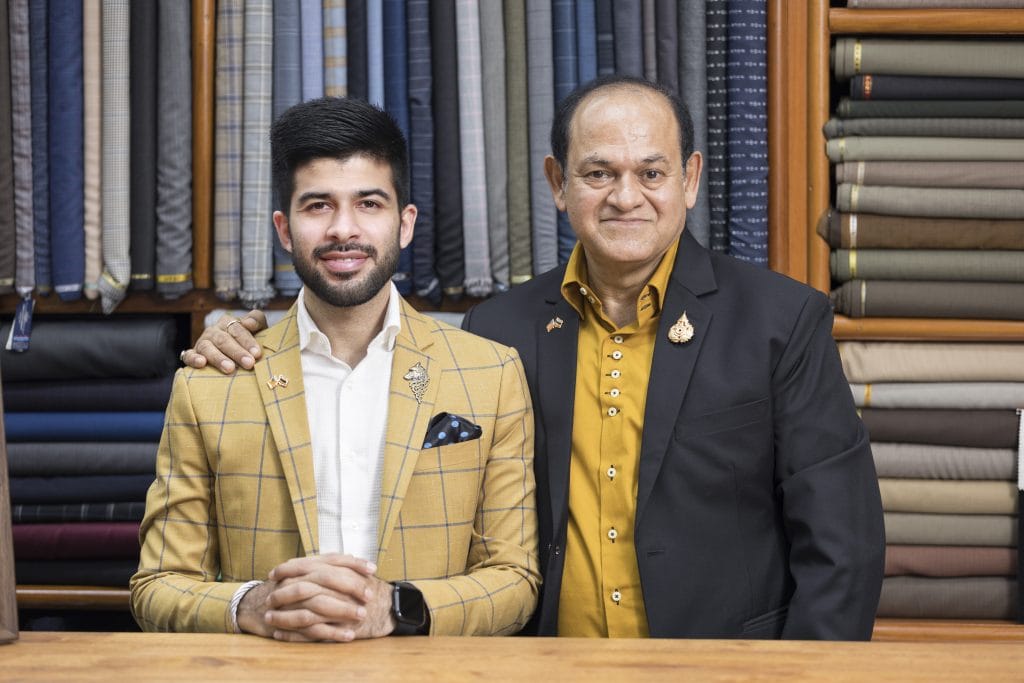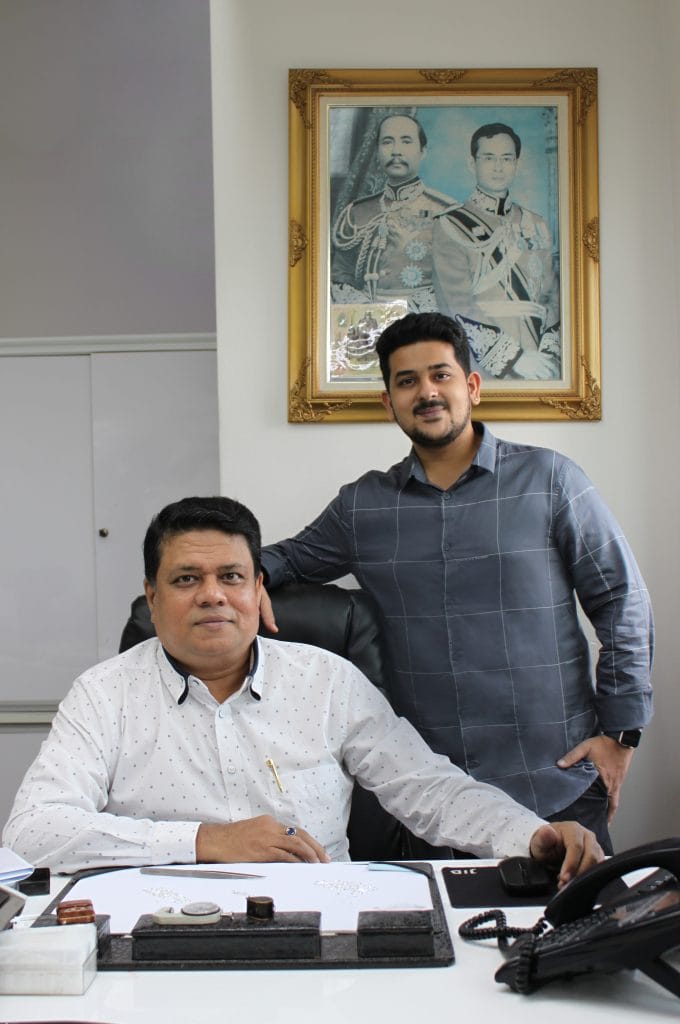It’s in their DNA!
By Kripa Singh
Family and legacy go hand in hand. They also go from hand to hand, passed across generations like an heirloom. Fathers and sons building and expanding businesses together know the pressure of sustaining a legacy across the years, and they understand the blood, sweat, and open communication it takes.
According to a recent Deloitte report, “In Thailand, family-owned businesses have been growing strongly and rapidly, collectively contributing about THB 28 trillion or 72 percent of total business value, and over 50 percent of listed companies are family-owned businesses or run by families.”
Moreover, the “& Sons” suffix is becoming increasingly popular, as there is something reassuring about a company that has been passed down from one generation to another. However, balancing the dichotomy between their roles in a professional environment and their relationship at home while also navigating the generation gap can pose challenges for both men.
To understand the hard work behind the shiny veil of ‘heritage’ and ‘legacy,’ Masala speaks to two successful father and son dyads who share their secrets on running successful businesses and relationships together.
HARESH (SAM) & DEV MOHNANI
Amrapur Tailors
“Amrapur Tailors is a bespoke tailoring company that has been around since the 1960s, located in JusmagThai (Joint US Military Advisory Group) together with the Thai Armed Forces Coordinating Authority building,” Dev tells me. “We’ve been based in the US-Thai Embassy building for the past 50 years.”
“John, my grandfather, was working in the United States Air Force Kadena Air Force Base, Japan. He made military uniforms/ fatigues back in the day. In the earlier days, tailoring was a unique business and it was difficult to find good tailors. Our clients at the base were so happy with my grandfather’s splendid work that they offered him an opportunity to open a store here in Bangkok.”
What is the kind of legacy you want to create?
Sam: I want to create an easier lifestyle for my son. Easy doesn’t mean that everything is fed to him, but in other words, he shouldn’t struggle. He is hardworking and has a dedicated lifestyle. Clients have appreciated what he has been doing through the years and they enjoy his company – he’s got the mindset of the younger generation so he uses modern tailoring styles. I would like Dev to continue our legacy, which has been ongoing for decades.
How do you feel things have changed between generations?
Sam: Through the decades, it has been a fantastic ride! Clients have different wants and needs, and it is our job to suit them the right way. As the world has modernised, clients now ask for different types of fabrics, styles, and cuts. Some of our clients are law enforcement professionals who carry certain equipment, so we have to make sure that there is enough room for them to equip their weapons and radio. Because of these wants, management styles have changed too.
We have built up a team that takes care of quality control to ensure fine craftsmanship. Dev has definitely taken on the responsibility to make sure we are working on an easier and more efficient way to complete orders.
What were your expectations when he joined the family business and how did it differ from the reality?
Dev: I have been working with my dad since I was young. My parents trained me. I began with selling neckties and whatever I sold, that was my pocket money – I used to have a whole sum that I would then use to play games. I went to school here and completed my university here in Bangkok so I could always help around. I’ve always liked styling and creating different combinations, so joining the family business wasn’t a difficult task. Through the years, I would help clients choose what they like for both business wear or casual wear. I have learned what clients need and what they want.
How have you been inspired by your dad?
Dev: My dad has been building up the business for decades and he has always taught me to work hard. He has built up the company and has been recognised with awards from different United States presidents, congressmen, generals, police officers, and other dignitaries.
What are the advantages and disadvantages of the generation gap between both of you?
Dev: The generation gap has played a huge role in our management styles, the presence of a Quality Control department, and also working on different social media platforms to accept online orders. The advantage of the generation gap is that we are now able to focus on aspects that we couldn’t before. We can expand more and help clients around the world.
What are the advantages and disadvantages of working together?
Dev: Working with my dad has been delightful. You are always close to family and you know you can trust the people working in the team.
SHREYANS & RONAK JHAVERI
Thai Gem and Diamond Co., Ltd.
“My family has been in the diamond industry for over 30 years, specialising in fancy-cut diamonds,” Ronak explains when asked about their family business. “Dad was in the pearl industry for seven years, and was eventually introduced to the diamond industry by one of his uncles. He received training and was given the opportunity to expand in Bangkok, a lucrative market back in the day. In 1988, he made his first visit to Bangkok and hasn’t looked back since.
“I graduated in 2017 and took a Diamonds & Jewellery Design course in 2018 to excel in the field. After the course, I realised there was a void in the Thailand market for reliable custom jewellery designers targeting expats. So I started my own company, Rever, in 2019.”
What is the kind of legacy you want to create?
Ronak: My dad wants me to establish a brand and take the family name forward. He’d like me to continue to expand in the field, and be known to provide the best-quality bespoke jewellery, at the best price, and satisfy every customer by tailoring the jewellery to their needs.
How do you feel things have changed between generations?
Ronak and Shreyans: Online media is a big shift. Door-to-door sales is an old concept with the advancement of technology. The industry used to be physically demanding, but now the challenge lies in building a supply chain that self-sustains with the power of media.
As for changes in the industry, technological advancements in machinery is promoting innovation to unforeseen heights.
What were your expectations when he joined the family business and how did it differ from the reality?
Ronak: I wanted to join the family business since day one after seeing its market potential. However, at the same time, I also wanted to start my own venture in the same industry. Seeing the movement in the diamond market, I was expecting a faster turnover for jewellery too, but the process is much slower than expected.
Although the end result is far more fruitful, the process from customer acquisition to closing a sale for a piece of jewellery is much slower and more tiresome than anticipated.
How have you been inspired by your dad?
Ronak: I have seen him overcome the struggles of this industry. He has built this empire from scratch and gone through all the market highs and lows without giving up. The trust and positive influence he has built for himself in the market is truly inspiring in both my personal and professional life. It’s a quality I wish to possess one day.
What are the advantages and disadvantages of the generation gap between both of you?
Ronak and Shreyans: As compared to other industries, the daily workings of the gems and jewellery industry is still old school, and experience comes with age. So the generation gap brings wisdom in this case. The knowledge of the product and the transformation of the industry can only be taught by the older generation.
You need the generation gap to understand the evolution of this market. The disadvantage comes in when as the new generation, we want to make technological shifts in terms of marketing/sales. Believing in the power of online marketing comes naturally for the new generation, but since the industry is still in the hold of the old generation, experimenting with tools like social media is a fairly new concept for them.
What are some of the advantages and disadvantages of working together?
Ronak: The bar is too high when working with your dad. What he has succeeded in is the bare minimum I will need to achieve. It can be tough sometimes, especially because now the competition is much greater.
On the contrary, a big advantage is the trust and support. The insights my dad can offer will be like no other. It’s black and white. At the same time, he can trust me with the work and goods better than he could trust just any staff. Another advantage is that important discussions can be done anytime of the day, as long as there is a balance between work and home. When dealing with high-value goods, having a discussion whenever required brings peace of mind.








